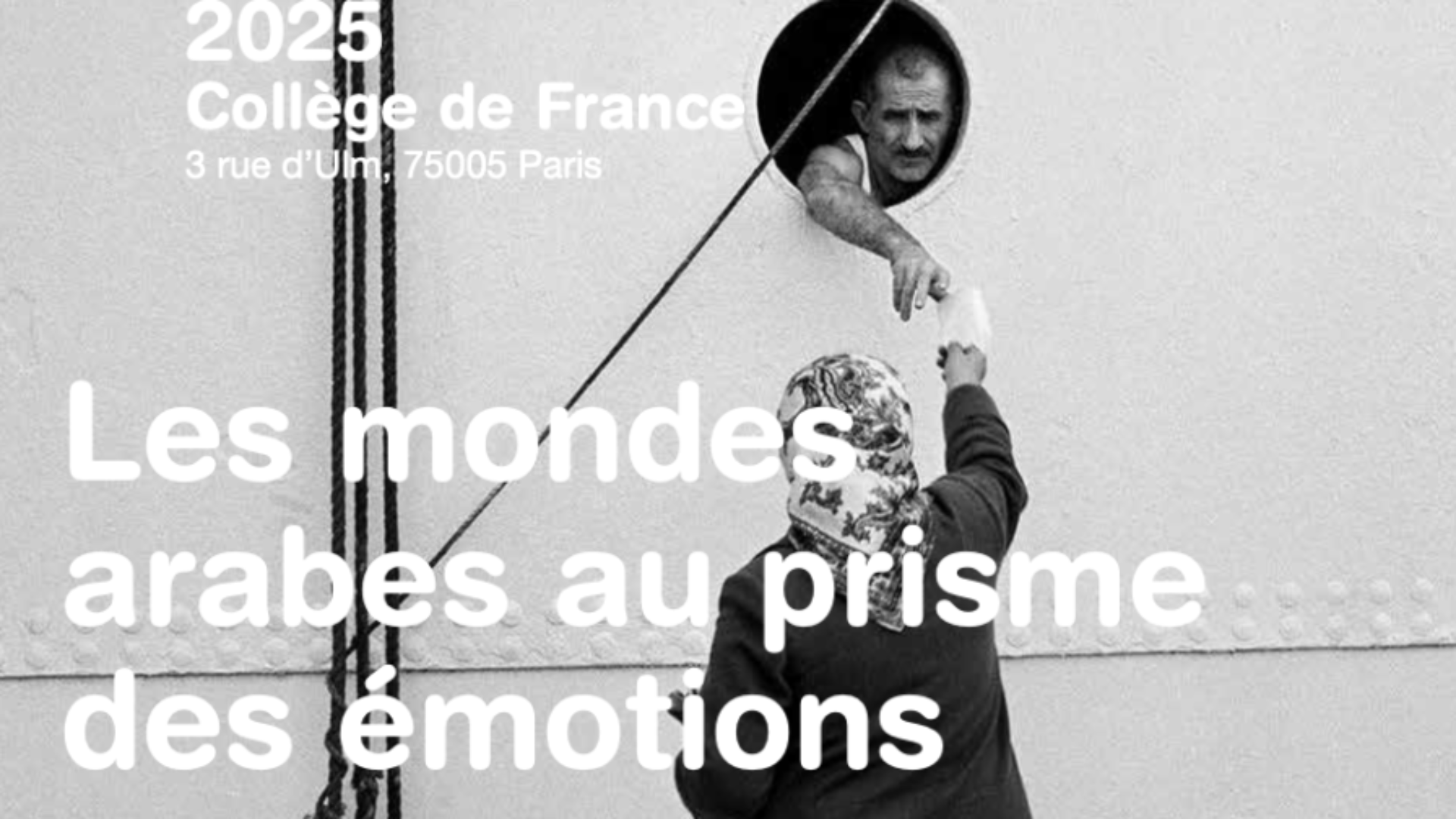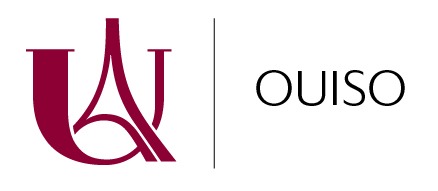The Circle or Researchers on the Middle East (CCMO) is organising its 10th annual conference on “Arab Worlds through the lens of emotions”. It will take place on Tuesday and Wednesday 14th and 15th of October 2025 at the Collège de France in Paris. Founded in 2010, the association aims to ensure the visibility of the work of each young researcher, and publishes articles on its website after validation by a reading committee. Each year, the association organises an annual conference, as well as doctoral seminars and meetings with specialists from the region.

Visual from the CCMO call for papers
Black and white photo taken in 1955 on the docks of Galata, Turkey. Goodbye scene on the Turkish docks. An elderly woman wearing a headscarf and a long dress stands with her back turned to us and reaches out to a man whose head and arm are the only things sticking out of the porthole of a large ferry. Information superimposed on the image: 2025, Collège de France, 3 Rue d’Ulm, 75005 Paris, “Les mondes arabes au prisme des émotions”.
© Ara Güler, Saying good-bye on the Galata quay (1955) | Magnum Photos
Call for papers – 10th annual conference of the CCMO
Scientific committee : Dima ALSAJDEYA, Laure ASSAF, Özge BINER, Marion SLITINE, Manon-Nour TANNOUS
Presentation
The recent upheavals in the Middle East and the Maghreb have generated a profound emotional intensity, both locally and globally, dramatically conveyed and made visible through social media. These digital platforms have become key channels for sharing, in real time, the raw emotions triggered by the major political and social events that have marked the region in recent years: the horror, fear, and suffering experienced in Gaza in response to images of massacres, serving both as powerful testimony and as an act of resistance against the dehumanizing discourse of the Israeli state; the relief, shock, and disbelief surrounding the opening of prisons in Syria, symbolizing both liberation and trauma; the outrage sparked by the expulsion of migrants by security forces into the desert in Tunisia, sometimes disturbingly met with approval by local populations; the shock provoked by the earthquakes of 2023 in Syria, Turkey, and Morocco; and the sense of stupefaction emanating from Lebanon, where images of material destruction caused by the port explosion and, more recently, by Israeli bombings intertwine with poignant messages from the diaspora expressing existential anxiety.
These emotions, however, are also subject to heightened scrutiny, often met with suspicion or criticism. For instance, anti-Zionist Jewish movements have denounced the difficulty of publicly expressing grief after October 7, 2023, without facing the risk of political instrumentalization in support of a war-driven agenda. Similarly, in Europe and North America, the im- perative to moderate expressions of anger and indignation in public discourse has become a pressing concern, under threat of accusations of glorifying terrorism—or, more recently in the United States, even the risk of deportation. Finally, explicitly political emotions such as shamāta—the malicious joy felt at the misfortune of others, notably observed among some Syrians celebrating Hezbollah’s setbacks during the Israeli strikes of September 2024—reveal the complex and ambivalent nature of affect in times of geopolitical crisis, increasingly marked by uncertainty.
Long a central concern in the social sciences, emotions nonetheless struggled to gain re- cognition as a subject of study in their own right. At the turn of the 21st century, however, a shift began to take place. Starting from the premise that sociology, anthropology, and history can only address what is expressed, a growing number of scholars have focused on the registers, modes of expression, and conditions of enunciation of emotions, rather than on a supposed inner feeling that remains inaccessible to retrospective observation. In parallel, several studies have demonstrated that affective experience—as well as its forms of expression—is socially constructed. Far from being a purely internal phenomenon or a “raw and universal material” outside the realm of the social (Fer, 2014), emotion connects us to others and to our environment, both of which shape it as much as our personal history does. Conceived either as an “experience” (Quéré, 2012) or as a “transformative force” (Petit, 2021), emotions are fully embedded in the fabric of social life: they act upon individuals while also serving as vectors for action on the collective—whether in terms of norms, institutions, habits, or rules.
To learn more about this conference and the association hosting it, find the rest of this abstract on the Circle of Researchers on the Middle East (CCMO)’s website.
Goals of the conference
This call for papers invites specialists from different disciplines and from different countries in the region to take stock of current research, in a context where current emotional events are particularly charged. The aim is to explore the way in which emotions are deployed, circulated, regulated or instrumentalised, at a time when their digital expression is playing a decisive role in understanding and representing contemporary conflicts. The aim of the conference is to bring together researchers who analyse emotions from both a theoretical and a methodological perspective, focusing on their relational dimension – taking into account the circulation and confrontations between individuals, groups and institutions – and on their material, temporal and spatial roots. The aim of the conference is to provide a multidisciplinary account of the way in which emotions are increasingly invading contemporary research, and to bring together papers focusing on three specific areas of the social – the intimate, the political and the digital – which are considered in dialogue rather than in isolation.
Organisation of the conference
- Research Axe 1. Emotions : beyond the intimate
- Research Axe 2. Political emotions in a Conflict-Affected Region
- Research Axe 3. Affects and Digital Technology: transformations in the emotional experience ?
Participation guidelines
Abstract submissions (500 words, in French or English) should be sent by email to the organizers at colloqueccmo@gmail.com by June 30, 2025. Submissions must specify the materials utilized (archives, interviews, observations, etc.) as well as the research methodology. Presentations based on rigorous empirical work will be favored. Both comparative and monographic studies are equally welcome. Responses will be communicated by July 15.
Send your application at : colloqueccmo@gmail.com
